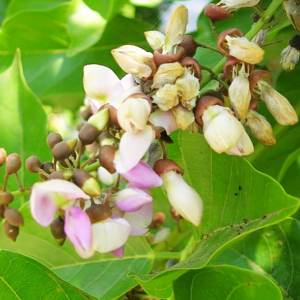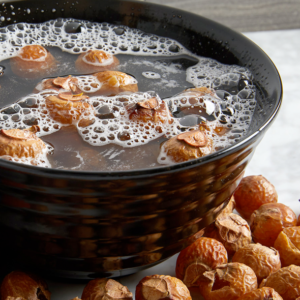 Karanja oil, also known as pongamia oil, is derived from the seeds of the Pongamia pinnata tree. It has been used for various purposes, including agricultural applications. When used on plants, karanja oil can offer several benefits:
Karanja oil, also known as pongamia oil, is derived from the seeds of the Pongamia pinnata tree. It has been used for various purposes, including agricultural applications. When used on plants, karanja oil can offer several benefits:
- Natural Insect Repellent: Karanja oil contains compounds like pongamol and karanjin, which possess insecticidal properties. When applied to plants, it can act as a natural insect repellent, helping to deter and control pests like aphids, caterpillars, whiteflies, and mites.
- Antifungal Properties: The oil also exhibits antifungal properties, which can help protect plants from fungal infections and diseases. Fungal issues like powdery mildew and rust can be mitigated with the use of karanja oil.
- Nematicidal Activity: Nematodes are microscopic worms that can cause damage to plant roots, leading to stunted growth and poor nutrient uptake. Karanja oil has been found to have nematicidal properties, which can help control these harmful pests.
- Plant Growth Promoter: Some studies suggest that karanja oil may have growth-promoting properties for plants. It can enhance root development, stimulate growth, and improve overall plant health, leading to increased yields in some cases.
- Biodegradable and eco-friendly: Karanja oil is considered a more environmentally friendly alternative to synthetic pesticides and chemicals. It breaks down relatively quickly in the environment, reducing the risk of long-term contamination.
- Nutrient Source: Karanja oil cake, a byproduct obtained after extracting the oil, can be used as an organic fertilizer. It is rich in nutrients like nitrogen, phosphorus, and potassium, which are essential for plant growth.
- Soil Improvement: When used as a soil amendment, karanja oil cake can help improve soil structure, water retention, and microbial activity, contributing to a healthier and more productive growing environment for plants.
It’s important to note that while karanja oil can be beneficial for plants, like any natural product, it should be used with care and proper dilution to avoid any potential negative effects. Before applying karanja oil to a large number of plants or using it extensively, it’s advisable to conduct a small test on a few plants to ensure there are no adverse reactions.
Emulsifying karanja oil before application is needed. Unscented soap nut soap works amazing and is all natural.
 Soap Nut Soap
Soap Nut Soap
Soap nut soap, also known as soapberry soap or simply soap nuts, is a type of natural soap made from the dried shells or husks of the soapberry (Sapindus) fruit. Soap nuts are berries that grow on certain trees belonging to the Sapindus genus, primarily Sapindus mukorossi and Sapindus trifoliatus.
The soap nuts contain a natural surfactant called saponin, which has cleansing properties when it comes into contact with water. Saponin is released from the soap nut shells when they are agitated or soaked in water, creating a soapy solution that can be used for cleaning.
To make soap nut soap, the dried soap nut shells are typically ground into a powder or used whole. The soap nut powder or whole nuts are then combined with water to create a liquid soap or a soap nut paste. This natural soap can be used for various cleaning purposes, including laundry, dishwashing, personal hygiene, and general household cleaning.
Benefits of soap nut soap:
- Natural and biodegradable: Soap nut soap is a sustainable and environmentally friendly alternative to conventional synthetic detergents. It is entirely natural and biodegradable, meaning it breaks down easily in the environment without causing harm.
- Hypoallergenic: Soap nuts are generally hypoallergenic and gentle on the skin, making them suitable for people with sensitive skin or allergies to harsh chemicals often found in commercial cleaning products.
- Non-toxic: Since soap nut soap is chemical-free and made from natural ingredients, it is safe to use around children, pets, and plants.
- Multi-purpose cleaner: Soap nut soap can be used for a wide range of cleaning tasks, from washing clothes and dishes to cleaning surfaces and even as a body wash or shampoo.


